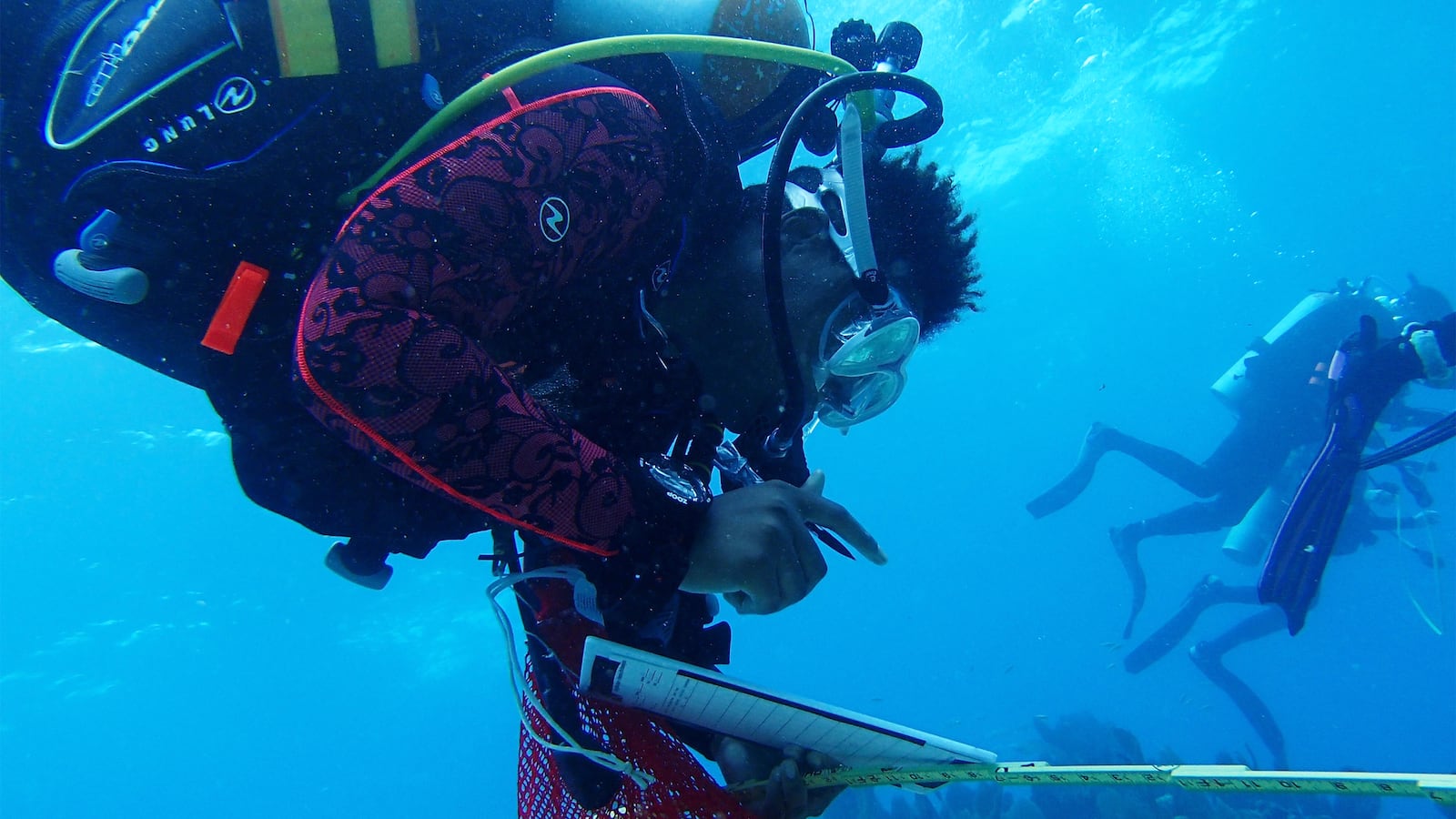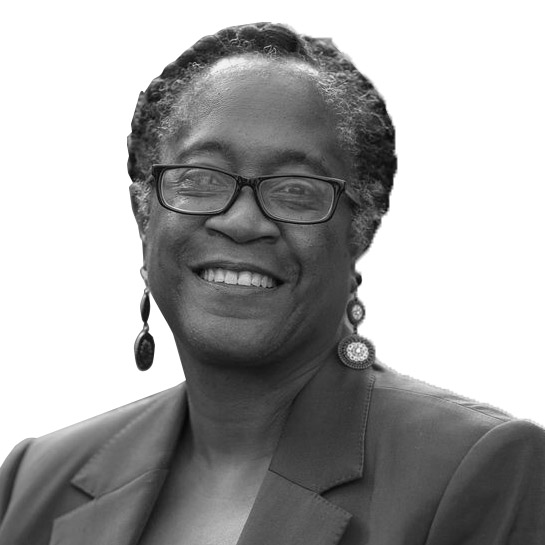The Devils Hole pupfish is the rarest fish on the planet, with fewer than 200 in the world. Though the stats are not quite as stark, Black women divers are also a rarity. More than 85 percent of professional divers in the U.S. are men, 63 percent of all divers are white, and 9 percent Black, according to Zippia.
Despite these small numbers, Black women are making their mark in organizations like Diving With a Purpose, founded by Ken Stewart in 2003 to provide education, training, certification, and field experience to adults and youth in maritime archaeology and ocean conservation. DWP focuses on the protection, documentation and interpretation of African slave trade shipwrecks and the maritime history and culture of African Americans.
Ayana Omilade Flewellen, PhD., Rebecca Hunter, and Shirikiana Gerima are aqua adventurers who dive with DWP and volunteer as mentors and instructors with the organization, shared stories of how they came to diving, their experiences diving around the world, searching for slave wrecks, teaching the next generation and more.
Flewellen is an assistant professor at Stanford University’s Department of Anthropology and a marine archaeologist, one of about 20 Black women in the U.S. with this certification. The 32-year-old has been a diver since 2016. She was inspired by a DWP board member she met at a conference who was looking for Black archaeologists to learn maritime archaeology. “Hearing about the mission of DWP opened my mind to the possibility. Before that meeting, I never imagined I would become a diver or do underwater archaeological work. Once I was in the water, there was no way of getting me out. I was hooked,” Flewellen says.

Rebecca Hunter.
Matthew LawrenceTo do underwater research you must obtain a Scientific SCUBA Driving certification through the American Academy of Underwater Sciences, a process that can take 6-12 months. “We learn so much during our certification, including the history of diving, regulations, human physiology underwater, elementary chemistry for gas compositions as well as underwater navigation.”
Flewellen’s come a long way from that girl trying to swim during summer camp who nearly drowned. (Her mother ended up enrolling her in a free swim program.) Now, Flewellen has dived in St. Croix, St. John, the Red Sea in Egypt, and Florida.
“I’ve done work around ships involved in the Transatlantic Slave Trade like the Clotilda (the last known slave ship to arrive in the U.S.) project in Mobile, Alabama. It was an amazing experience to dive on a vessel known to have carried enslaved Africans across the Atlantic. It is also the only ship found to date that has the most intact hull where enslaved Africans were held. Emotional doesn’t even begin to articulate what that experience was like. To actually touch the wood of that vessel, to be able to hold fragments of that history… I actually don’t have words for it, just a deep reverence.”
She has never encountered danger while diving, “But one time while doing a coral survey in Key Biscayne a huge white manta ray swam right up beside me and was like, ‘What are you doing here?’. It scared the life out of me! The ocean is full of life, they are as curious about us as we are about them.”
What’s troubling, she says, is “in the 21st century we are still dealing with ‘firsts’. In 2008 Grace Turner was the first Black woman to get a masters in maritime archaeology. The field is inaccessible for many of us, in terms of representation, cost, and educational obtainment. Until recently there were no internal drives from within the discipline to shift that. DWP has changed that.”
She’s optimistic though. “There are barriers like the cost of training, the cost of equipment and for education field schools for students, but Black women are making strides, simply by showing up and carving out our own paths and ensuring that those pathways are sustainable for people who come after us.”
The truth is, it’s not only those issues. Black people have a history with water, coming to this country via ships, being dumped in rivers—there is real trauma. “Black Americans didn’t always have access to public pools and beaches which I would argue left generational scars in regard to our relationship to water,” she says.
But the rewards are huge for taking to the water. “I gained a new-found sense of how interconnected everything is.”
What’s her word to other Black women? “The water is calling. There is a whole other world to experience.”
Rebecca Hunter was a snorkeler, who while on vacation in Mexico more than two decades ago was encouraged by a friend to try scuba. She took an introductory course, and they did a shallow dive. She would go on to get her certification in 1998. She’s retired and at 61, spends her time between California and Florida. She’s been diving for 25 years in far flung locales such as Indonesia, the Maldives, Fiji, Egypt, Tahiti, and Australia.
It didn’t come easy at first.
“I had to get out of my own head. I experienced a great deal of anxiety. It would sometimes hit me that there was a huge amount of water between me and the surface. I learned to calm myself by touching another person to center myself and I also tried underwater photography to focus my attention on finding something to photograph,” says Hunter, who volunteers with the DWP Maritime Archaeology Program and the DWP Cares Coral Program as an instructor and mentor. She is a lifetime member of the National Association of Black Scuba Divers.
“I had always hoped to get up close to whales, sharks, dolphins and I have,” she says but she gets as much joy peering into holes and crevices for small creatures and watching the sea life exist and co-exist in its natural environment. “Although there’s a lot of activity down there, the ocean is also a very peaceful place where the only sound you hear is our own breathing. It’s beautiful.”
There’s beauty below, but above on the boat, there can be challenges. “I was the only Black woman on a dive boat. Needless to say, there was not much enthusiasm when everyone else learned that someone would need to be my dive buddy. But I think more people are becoming aware of the fact that we are here. Black women are getting more exposure thanks to the climate in the country and world that has forced some to acknowledge our presence and qualifications.”
Shirikiana Gerima is psyched to return to the hunt for the slave ship Guerrero shipwreck in July. After two decades of searching, the DWP and Biscayne National Park are partnering to go for what may be the final mission after 20 years of searching in those waters for it. “I am so excited!” she confesses. “We have been trying to make a positive identification for years. We’re getting close.”
Gerima is a certified dive master, scientific diver, and DWP instructor, and is working on becoming a diving instructor. She’s been diving since 2013. “I love diving, particularly as it relates to finding ways to make the world a better place,” says the 67-year-old filmmaker and co-founder of Sankofa Video and Books & Café in Washington, D.C. “This is what my work in film and my bookstore has always sought to do and now, extending this work into the oceans has been wonderful.”
She was doing laps in a swimming pool in Washington, D.C. with her daughter when she saw some Black divers training in the pool, and asked them how she might become one, too. These days she’s training young folk in marine archaeology advocacy through DWP, and working with organizations on coral conservation.
Gerima was part of the crew in 2015 scouring the waters of Biscayne National Park in Florida for the Guerrero. “It’s emotional and a little eerie, but at the same time I feel like I have a mission to uncover history, to not waste my time on the planet. Discovery is important. You think about how long those souls have been wondering when someone was coming for them. It’s spiritual. I want them to know that we’re trying to understand what they went through and grateful for their bravery.”
Protecting cultural heritage in the ocean is top-of-mind. “We don’t want these sites to be destroyed and looted, but to preserve history to see what can be learned.”

